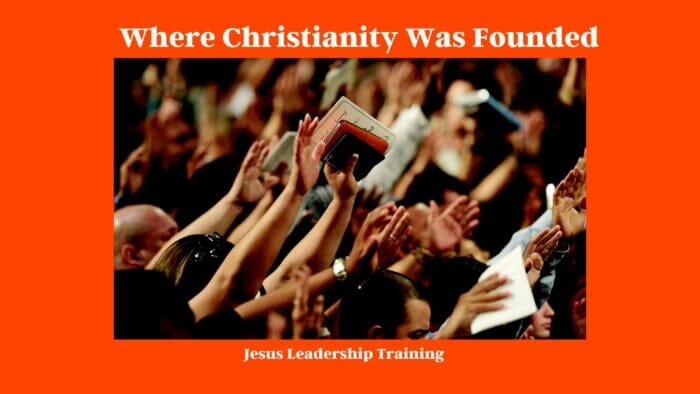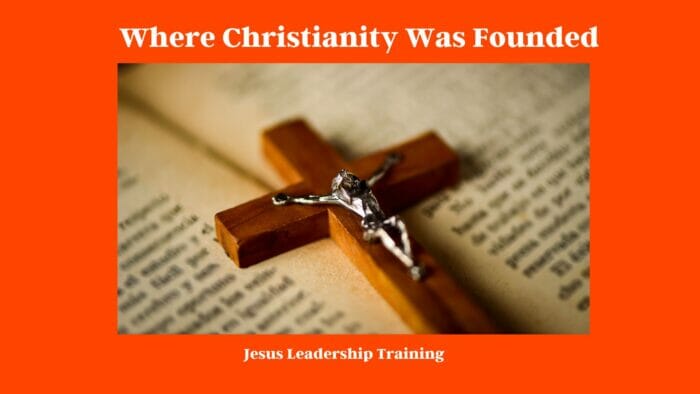Embark on a fascinating journey tracing back to where Christianity was founded. Discover the roots, initial struggles, growth, and global influence of one of the world’s major religions.
When we ponder the question, “Where was Christianity founded?“, we are essentially asking about the roots of a religion that has, over centuries, profoundly shaped the course of human history. Christianity’s genesis lies not merely in a geographical location, but also in a historical and spiritual context. So let’s unravel the intricacies of this journey, to better understand how it has shaped our world today.
Table of Contents
Where Christianity Was Founded
Christianity, as the name implies, was centered on the teachings of Jesus Christ. The region that cradled these teachings is the ancient land of Judea, now part of modern-day Israel and Palestine.
The Birthplace of Christianity: Ancient Judea (Christians)
Approximately two millennia ago, Judea was a province of the Roman Empire, which was where the narrative of Christianity begins. The religious landscape at the time was marked by Jewish monotheism, Roman polytheism, and an assortment of other religious practices.
Jesus of Nazareth: The cornerstone of Christianity, Jesus was born in Bethlehem of Judea around 4 B.C. Raised in Nazareth, his public ministry in and around Judea laid the groundwork for the Christian faith. His teachings, focused on love, forgiveness, and personal morality, challenged both the religious and political authorities of the day, leading to his crucifixion around A.D. 30.

Christianity’s Emergence Post-Crucifixion (Jesus)
The crucifixion of Jesus was a pivotal event that marked a significant turning point in the Christian faith. The resurrection of Jesus, celebrated on Easter Sunday, became the cornerstone of Christian faith.
Early Christians: The disciples of Jesus and other early followers, known as Apostles, began to spread his teachings after his death. It’s important to remember that these early Christians were essentially a sect within Judaism initially.
Table that Represents the Spread of Christianity (History)
| Period | Region | Key Figures | Significant Events |
|---|---|---|---|
| 1st Century AD | Jerusalem and surrounding regions | Jesus Christ, Apostles like Peter, John, and Paul | Crucifixion and resurrection of Jesus Christ, Pentecost, missionary journeys of Paul |
| 1st-3rd Century AD | Roman Empire (including Asia Minor, Greece, Italy) | Early Church Fathers like Ignatius of Antioch, Clement of Rome, Irenaeus of Lyons | Persecution under Roman emperors, the writing of the New Testament, establishment of key doctrines |
| 4th Century AD | Roman Empire, North Africa | Constantine, Augustine of Hippo | Edict of Milan (313 AD) legalizes Christianity, Council of Nicaea (325 AD) affirms key doctrines, spread of monasticism |
| 5th-6th Century AD | British Isles, Germanic tribes | St. Patrick, St. Columba | Christianization of Ireland and Scotland, conversion of Anglo-Saxons in England |
| 7th-11th Century AD | Scandinavia, Slavic lands | St. Cyril and St. Methodius | Conversion of the Vikings, Cyrillic script created to evangelize Slavs |
| 12th-15th Century AD | Far East, Africa | Francis Xavier, explorers like Vasco da Gama | Arrival of Christianity in India, China, and Japan, Portuguese missionaries in Africa |
| 16th-19th Century AD | Americas, Australia | Spanish and English colonists, missionaries like David Livingstone | Christianity introduced to Native American tribes, colonization of Australia, missionary work in Africa |
| 20th-21st Century AD | Global | Billy Graham, Pope John Paul II | Evangelical revivals, global missionary work, Vatican II, growth of Christianity in Africa and Asia |
Please note that this table is highly simplified. The spread of Christianity is a complex topic that spans over 2000 years and has been influenced by countless people, events, and cultural factors.
Christianity’s Expansion Beyond Judea
Christianity didn’t remain confined to its birthplace. The faith’s message began to spread beyond Judea, largely thanks to the tireless efforts of the Apostles and other early Christians.

The Apostle Paul and The Gentiles (God)
One person who was instrumental in this expansion was the Apostle Paul. Paul, originally a staunch Jew named Saul who persecuted Christians, converted after a divine revelation on the road to Damascus.
Paul’s Missionary Journeys: Paul embarked on several missionary journeys across the Roman Empire, preaching the Gospel to the Gentiles (non-Jews). His work led to the establishment of numerous Christian communities in Asia Minor and Greece.
Table Representing the Three Missionary Trips of Paul, Time and Regions
| Missionary Journey | Time Period | Key Regions Visited |
|---|---|---|
| First Journey | Around 46-48 AD | Departed from Antioch in Syria, visited regions in Cyprus (Salamis and Paphos), and Asia Minor (modern-day Turkey), including Pisidian Antioch, Iconium, Lystra, and Derbe. |
| Second Journey | Around 49-52 AD | Departed from Jerusalem and went through Antioch, Syria and Cilicia, revisiting regions in Asia Minor and then over to Macedonia in Europe, visiting cities like Philippi, Thessalonica, and Berea. He also spent time in Athens and Corinth in Greece, before returning via Ephesus and Caesarea. |
| Third Journey | Around 53-57 AD | Paul revisited regions in Asia Minor and Greece, spending significant time in Ephesus and then onto Macedonia, Greece, where he stayed in Corinth for three months. He then traveled back through Macedonia and Asia Minor, stopping at Troas, Miletus, Tyre, and Caesarea before ending in Jerusalem. |
This table simplifies the complex routes that Paul took on his three major missionary journeys. These trips were filled with many significant events, including preaching, conversions, confrontations, and miracles, all contributing to the spread of the Christian message throughout the Roman Empire.
The Expansion into Rome
The faith also made its way into the heart of the Roman Empire, Rome itself, a development that would have profound implications for Christianity’s future.

Christianity in Rome: Initially, Christians in Rome were persecuted. However, things changed dramatically with the conversion of Emperor Constantine in the 4th century. His endorsement led to Christianity becoming the state religion, causing it to spread throughout the Roman Empire.
6 Effects of Constantine on the Christian Faith
- Legalization of Christianity: One of the most significant effects of Constantine on the Christian faith was his legalization of Christianity throughout the Roman Empire. He issued the Edict of Milan in 313 CE, which granted religious freedom to all faiths. This allowed the Church to spread Christianity throughout the Empire without fear of government persecution.
- Official Recognition: Constantine declared Christianity to be the official religion of the Roman Empire in 321 CE. This gave Christianity a level of recognition and legitimacy that had not previously been seen. This helped to legitimize the faith and gave it a degree of protection from outside forces.
- Unifying Force: Christianity provided a unifying force in the diverse and often divided Roman Empire. Constantine saw this as an opportunity to bring the disparate peoples of the Empire together under one faith. This allowed for a greater sense of unity and common purpose among the people.
- Expansion of Church Authority: With the legal recognition of Christianity, the Church was able to expand its authority and influence. This led to the establishment of a hierarchical structure within the Church and the development of a more organized form of worship.
- Creation of a New Canon: With the legalization of Christianity, it was necessary to create a unified set of texts to be used as scripture. This was done with the Council of Nicaea in 325 CE, which established the New Testament canon. This was a major milestone in the history of the Church and allowed for the development of a unified set of beliefs.
- Promotion of Religious Education: Constantine encouraged the establishment of schools to educate the population on the Christian faith. This was an important step in the spread of Christianity throughout the Empire, as it allowed for a greater understanding of the faith and its teachings.
Christianity’s Evolution Over Centuries
Christianity has continuously evolved, adapting to different cultural contexts and historical epochs.
Major Historical Events that Propelled the Growth of Christianity
| Historical Event | Description | Impact on Christianity |
|---|---|---|
| The Crucifixion and Resurrection of Jesus (Around 30 AD) | Jesus was crucified by Roman authorities, and His followers claimed that He resurrected three days later. | The resurrection became a central event in Christian belief, validating Jesus’ divine identity and His message. This inspired the disciples to spread Jesus’ teachings. |
| The Day of Pentecost (Around 30 AD) | The Holy Spirit descended on the followers of Jesus in Jerusalem. | This event is considered the birth of the Christian Church, and it empowered the disciples to begin proclaiming the Gospel. |
| Paul’s Conversion (Around 33-36 AD) | Saul of Tarsus, a persecutor of early Christians, converted and became Paul. | Paul became one of the most influential figures in early Christianity, spreading the faith among Gentiles and establishing several Christian communities. |
| The Council of Jerusalem (Around 50 AD) | Early Church leaders met to discuss the requirement of Mosaic law for Gentile converts. | This council determined that Gentile converts did not have to fully adhere to Jewish law, effectively opening the door for the mass conversion of Gentiles. |
| The Destruction of Jerusalem (70 AD) | The Roman Empire crushed a Jewish revolt and destroyed the Second Temple. | The event scattered the Jewish population, leading to the spread of Christian communities throughout the Roman Empire. |
| The Edict of Milan (313 AD) | The Roman Emperor Constantine issued an edict that officially tolerated Christianity. | This allowed Christians to openly practice their faith, leading to a rapid increase in converts and the integration of Christianity into mainstream society. |
| The Council of Nicaea (325 AD) | This council formulated the Nicene Creed, defining orthodox Christian beliefs. | This led to the establishment of a unified Christian doctrine and further organized the Church. |
| The Fall of Western Roman Empire (476 AD) | The Western Roman Empire fell to invading Germanic tribes. | Many of the invading tribes had adopted Arian Christianity, leading to the spread of Christianity among the Germanic peoples. |
| The Conversion of Clovis I (496 AD) | The Frankish King Clovis I converted to Christianity. | This event led to the mass conversion of the Frankish people and began the close alliance between the Church and the state. |
| The Great Schism (1054 AD) | Christianity split into the Roman Catholic Church in the West and the Orthodox Church in the East. | While this created divisions within the Church, it also led to the diversification and spread of Christianity in different forms. |
| The Crusades (1096-1291 AD) | A series of military expeditions by Western Christians to retake the Holy Land from Muslims. | Though not ultimately successful in their military goals, the Crusades stimulated religious fervor and spread Christianity further through Europe. |
| The Protestant Reformation (1517 AD) | Martin Luther challenged the authority and practices of the Roman Catholic Church. | This event led to the development of Protestantism and created new Christian denominations, broadening the reach and diversity of Christianity. |
| The Age of Exploration (15th-17th Centuries) | European powers explored and colonized regions around the world. | As explorers and colonists spread out, they brought Christianity with them, resulting in the faith spreading to the Americas, Africa, and parts of Asia. |
These events were significant in their historical contexts and had a major influence on the growth and spread of Christianity. Christianity today continues to evolve in response to cultural, societal, and political changes worldwide.
The Great Schism
One of the significant events in Christian history was the Great Schism of 1054, which divided the faith into Eastern Orthodoxy and Roman Catholicism.
- The Great Schism of 1054: This event marks the formal split between the Eastern Orthodox and Roman Catholic branches of Christianity. It began when Pope Leo IX excommunicated the Patriarch of Constantinople, Michael Cerularius, resulting in a long-term rift between the two churches. This rift eventually became permanent, leading to the first major split in the Christian Church since the original split between the Eastern Orthodox and Western Catholic branches in 1054.
- The Council of Nicaea: This event was the first major attempt to unify the Christian Church. In 325, the Council of Nicaea convened to discuss and decide on the theology of the Christian faith. The decisions made at this council, such as the divinity of Jesus, the Trinity, and the canon of Scripture, would go on to form the basis of Christian doctrine for centuries to come.
- The Protestant Reformation: This event began in 1517 when Martin Luther posted his 95 Theses on the door of the Castle Church in Wittenberg, Germany. This sparked a movement that would eventually lead to the creation of a new branch of Christianity, Protestantism. The Protestant Reformation fundamentally changed the landscape of Christianity, leading to the establishment of a variety of new churches and denominations.
- The First Ecumenical Council: This event was held in 381 and was the first major attempt to bring the various branches of Christianity together. The Council of Constantinople sought to resolve various theological disagreements and establish a unified doctrine for the entire Church. The decisions made at this council laid the groundwork for the subsequent development of the Christian Church.
- The Crusades: This event was a series of military campaigns launched by the Catholic Church in the 11th and 12th centuries. The Crusades were conducted in an attempt to reclaim the Holy Land from Muslim control. The Crusades had a major impact on the development of Christianity, both in terms of how it was perceived by other religions and how it evolved in terms of doctrine and practice.
The Protestant Reformation
In the 16th century, the Protestant Reformation, led by Martin Luther, further divided Western Christianity. This period of religious, political, and intellectual upheaval had lasting
impacts on the political landscape of Europe.
The Global Impact of Christianity
Today, Christianity is a faith practiced by billions worldwide. The question, “where was Christianity founded?” seems minuscule when one looks at the far-reaching impact of this religion.
Global Impact of Christianity
| Aspect | Impact |
|---|---|
| Demographics | Christianity is the world’s largest religion, with over 2 billion followers worldwide as of my knowledge cutoff in September 2021. It has influenced the demographics of continents, particularly Europe, the Americas, and Sub-Saharan Africa. |
| Culture | Christianity has had a profound impact on the arts, music, and literature worldwide. It has shaped holidays and calendars, traditions, and moral perspectives in many societies. |
| Law and Justice | Many legal systems worldwide have been influenced by Christian ethics and the Ten Commandments. Concepts such as human rights and the value of individuals have strong roots in Christian teachings. |
| Science and Education | Many of the world’s oldest and most prestigious universities were founded by Christians or Christian organizations. Christianity also played a significant role in the development of modern science, with many early scientists being devout Christians. |
| Healthcare | The Christian Church established some of the first hospitals in the Middle Ages, and many modern healthcare organizations have Christian origins. Christianity’s emphasis on compassion and care for the sick has shaped healthcare globally. |
| Social Services | Christian charities and organizations provide significant social services worldwide, including food distribution, disaster relief, education, and healthcare. |
| Politics | Christianity has influenced politics in many countries, shaping laws, public policy, and political discourse. It has played a central role in various social movements, including civil rights and anti-slavery movements. |
| Interfaith Dialogue | Christianity has participated in and contributed to interfaith dialogue, fostering understanding and cooperation between different religious and cultural groups. |
| Peace and Conflict | Christianity has both contributed to and mitigated conflicts. On one hand, it has been a source of division and conflict; on the other, it has been a powerful force for peace, reconciliation, and social justice. |
| Environment | Recently, many Christian groups have been active in environmental stewardship, driven by the belief in the sacredness of creation. Pope Francis’ encyclical “Laudato Si” represents a significant Christian contribution to global environmental discourse. |
This table provides a broad overview of the global impact of Christianity. Each of these areas could be explored in much more depth, as Christianity’s impact is multifaceted and varies widely by time, place, and cultural context.
Christianity and Western Civilization
The imprint of Christianity on Western civilization is undeniable, having influenced art, culture, law, ethics, and societal structures.
Christianity Around the Globe
From the Americas to Africa and Asia, Christianity’s influence can be felt. It has been adapted into various cultural contexts, giving rise to a fascinating diversity of Christian practices.
Other Key Terms
- Christianity place
- catholic church
- jewish christians
- bible trivia
- middle east
- share christianity
- access world
Frequently Asked Questions
1. When was Christianity founded?
Christianity was founded in the 1st century AD, following the death and believed resurrection of Jesus Christ.
2. Who founded Christianity?
Christianity was founded by the followers of Jesus Christ, particularly the Apostles, who spread his teachings.
3. Where was Christianity founded?
Christianity was founded in ancient Judea, which is part of modern-day Israel and Palestine.
4. How did Christianity spread from where it was founded?
Christianity spread from its place of origin through the missionary efforts of early Christians, particularly the Apostle Paul.
5. What major divisions have occurred in Christianity?
Two major divisions have been the Great Schism of 1054 and the Protestant Reformation in the 16th century.
6. What impact has Christianity had on the world?
Christianity has had a profound impact on art, culture, law, and societal structures. It continues to influence the world in various ways.
Final Thoughts – Where Christianity was Founded
To answer the question, “Where was Christianity founded?“, is to explore a journey that spans continents and epochs, a journey shaped by faith, conflict, and resilience. From its humble beginnings in ancient Judea, Christianity has grown to have a profound impact on the world, influencing countless aspects of human culture and society. Its historical odyssey continues to this day, making Christianity not just a religion, but a living, breathing story of faith and humanity.



